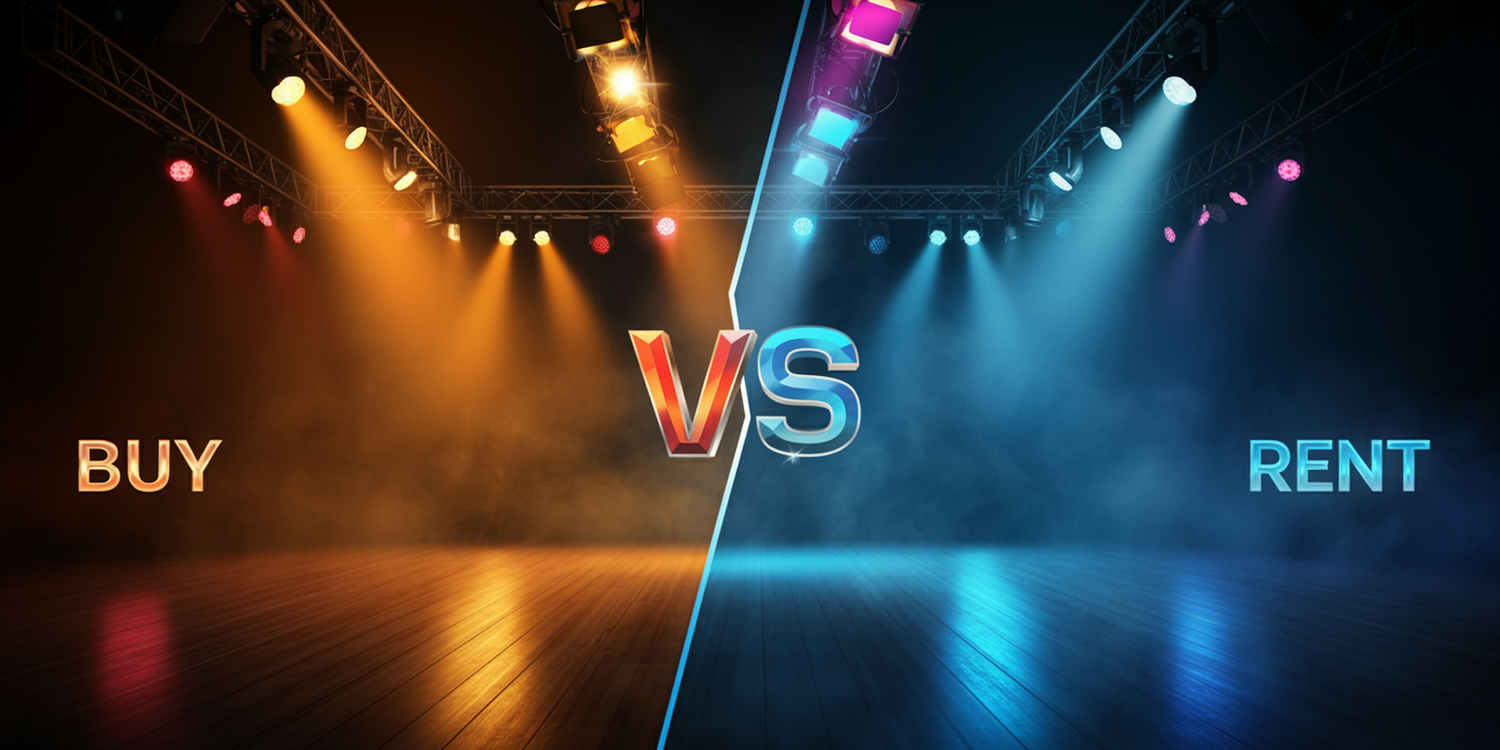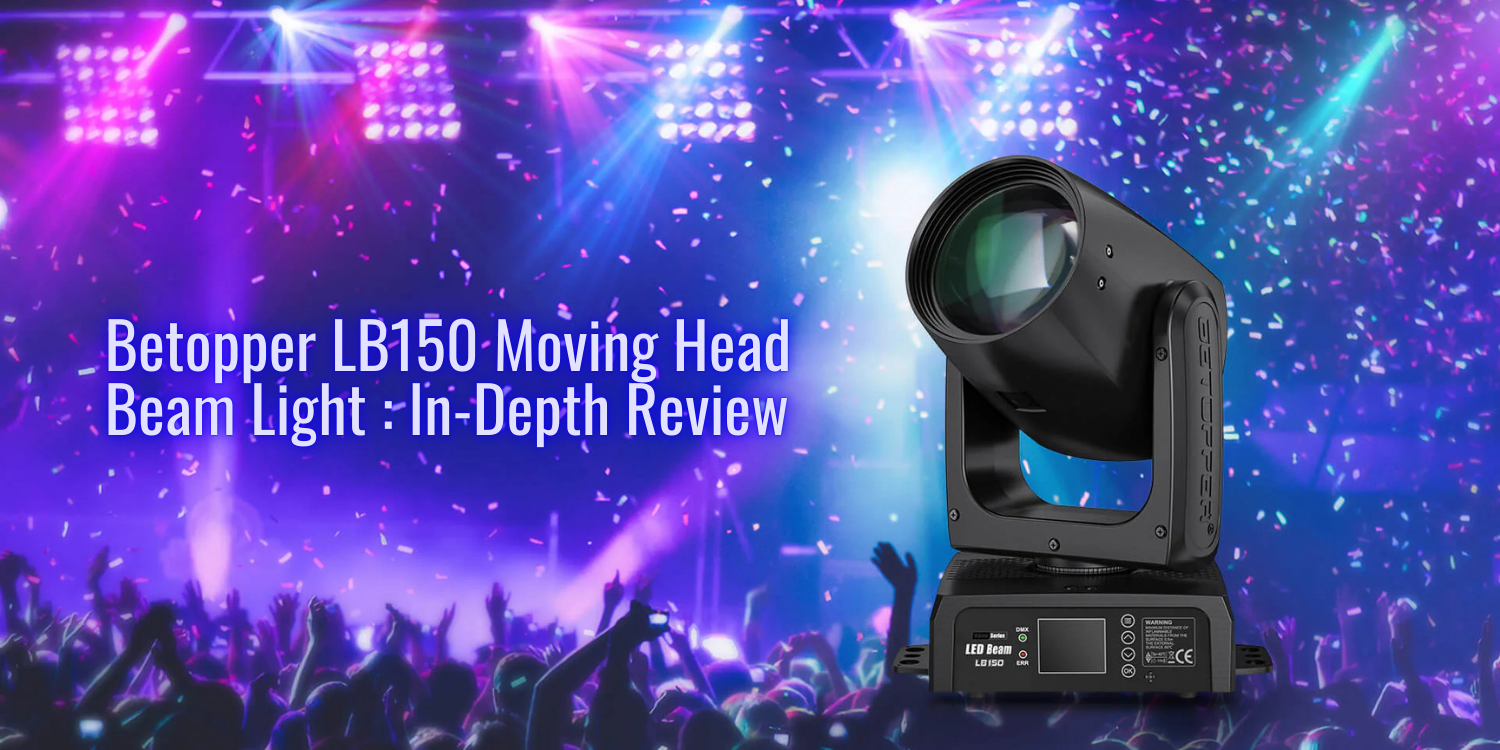Are you planning an event and unsure whether to buy or rent stage lights? It’s a big decision that can impact your event’s quality and your budget.
Both options have their benefits, but the right choice depends on your needs and goals. Whether it’s a one-time event, a concert, or a theatre production, this guide will help you decide. Let’s move in and explore the best option for your stage lighting needs!
Buying vs renting stage lights factor analysis
When deciding between buying or renting stage lights, it’s essential to understand the benefits and drawbacks of each option. Here's a breakdown to help you choose:
Long term vs short-term use

Buying stage lights is a better choice for regular use since it saves money in the long run by avoiding recurring costs. You pay once and don’t need to worry about installation or rental fees. Renting is perfect for occasional events or short-term use, as it’s more affordable and flexible. It lets you pay only for what you need without a large upfront cost, making it ideal for one-time or personal events.
Customization and variety

Buying stage lights offers full control over customization, allowing you to tailor your setup to meet specific needs and upgrade as technology evolves. This is ideal for venues hosting diverse events or requiring long-term consistency.
On the other hand, renting provides access to a wide range of equipment but limits customization to the rental company’s inventory. It’s a practical option for short-term needs or trying out the latest technology without the commitment of ownership.
Maintenance responsibility

Owning stage lights comes with the responsibility of regular maintenance and repairs, which can be both time-consuming and costly. From replacing bulbs to addressing technical malfunctions, maintaining the equipment ensures optimal performance but requires expertise and a dedicated budget. However, this investment can pay off in the long run, as you maintain control over the equipment's condition and lifespan.
Renting stage lights shifts maintenance responsibility to the rental provider. They handle repairs and upkeep, ensuring the equipment is in good working order when delivered. This makes renting a hassle-free option for those who want reliable performance without the added burden of ongoing maintenance.
Logistics and transportation

Buying stage lights means taking full responsibility for storing, transporting, and setting up the equipment. This can be a logistical challenge, especially for larger fixtures or if your venue changes frequently. Proper storage facilities and transportation methods are essential to protect your investment and ensure the lights are ready for use at every event.
Renting, on the other hand, often simplifies logistics. Rental companies typically handle delivery, setup, and pickup, saving you time and effort. This is particularly advantageous for temporary or one-off events, where managing the transportation of heavy and delicate equipment might not be practical.
Comparison table: buying vs. renting stage lights
|
Aspect |
Buying stage lights |
Rental stage lights |
|
Cost |
A high initial investment is required. |
Low initial cost |
|
Flexibility |
Less flexible, fixed equipment |
Highly flexible, as per according to needs |
|
Storage |
Requires space for storage |
No extra space required |
|
Resale value |
Can sell the equipment later to recover some cost. |
No resale value, purely expensive-based |
|
Maintenance |
The buyer is responsible for repairs and upkeep. |
Provider handles maintenance and repairs. |
|
Suitability |
Ideal for long-term use |
Perfect for a specific event |
Advantages of buying stage lights
For those who organize events, buying stage lights can be a smart and cost-effective choice. Below are some of the main advantages of owning your lighting equipment:
🎯Cost-effective for frequent use
Buying stage lights is a smart choice if you often host events. The upfront cost may be high, but it saves money in the long run by avoiding repeated rental fees. Over time, it becomes more economical than renting.
🎯Full control over equipment
Owning stage lights gives you full control to customize and experiment with lighting as needed. The equipment is always available, eliminating the need for bookings or waiting, making it ideal for urgent events or rehearsals.
🎯Consistency across events
Having your own lights ensures the same equipment is used every time. This helps you maintain consistent quality and style, especially for branding or professional performances.
🎯Potential resale value
If you decide to upgrade your lights, you can sell the old ones and recover some of the money you spent. This adds to the long-term value of owning your gear.
Disadvantages of buying stage lights
- High Upfront Cost: Buying stage lights can be expensive for high-quality or professional-grade equipment. This can be a challenge for smaller budgets or occasional users.
- Ongoing Maintenance Costs: Owning stage lights means you are responsible for their upkeep. Regular cleaning, repairs, and calibration are needed to keep them in good condition, which adds to the overall expense.
- Storage Requirements: Stage lights need proper storage space to prevent damage. If you don’t have enough room, this can become an added hassle and cost.
Steps to buy perfect stage lights
When buying stage lights, it’s important to know what you need. Think about the size of your stage, the type of performance, and the atmosphere you want to create. This helps you pick the right lights without overspending.
- Start with research
Start by assessing your event or venue requirements. Consider the size of the stage, the type of performance, and the mood you want to create. Decide whether you need basic LED lights, spotlights, or advanced systems with color-changing features.
- Compare options and brand
Explore different types of stage lights and their features. Read reviews, watch videos, and compare brands to find reliable products within your budget. Check for important details like brightness, durability, and compatibility with other equipment.
- Choose a trustworthy supplier
Find a vendor with a good reputation for quality and support. Look for warranties, flexible return policies, and responsive customer service. A trusted supplier can guide you in selecting the best options and provide long-term support for maintenance or upgrades.
- Consider after-sales service
Think beyond your immediate needs. Choose stage lights that are energy-efficient, so they can grow with your projects. Look for suppliers who offer varieties, warranties, technical support and easy returns. This ensures you get help with repairs, maintenance, or upgrades when needed, saving you time and hassle in the long run.
Advantages of rental stage lights
For one-time events or occasional use, renting stage lights can be a practical and budget-friendly option. Here are some key benefits of choosing rental lighting:
🎯Cost-effective solution
Renting stage lights is a budget-friendly option, especially for one-time events or occasional use. You avoid the large upfront cost of buying equipment and only pay for what you need.
🎯Access to modern technology
Rental companies often provide the latest lighting technology. This means you can use advanced equipment, like LED lights or lasers, without the long-term commitment of ownership.
🎯No maintenance worries
Maintenance and repairs are handled by the rental provider. This saves you both time and money, letting you focus on your event without worrying about upkeep.
🎯Best for every event
Renting gives you the flexibility to choose different lights for different events. Whether it’s a spotlight for a business presentation or vibrant LEDs for a concert, you can pick what suits your needs.
Disadvantages of rental stage lights
- High Long-Term Costs: If you often host events, the total rental fees can add up over time. In some cases, this might cost more than buying the equipment outright.
- Limited Availability: Popular lights may not always be available, especially during busy seasons. This could make it harder to get the specific equipment you need without early booking.
- Reliance on Rental Providers: Renting means depending on suppliers for delivery, setup, and removal. Any delays or issues from their side can affect your event plans.
- Booking Challenges: During peak times, finding the right equipment can be challenging. Without careful planning, you might need to settle for less suitable options.
Steps to rent stage lights
Renting stage lights is a practical and cost-effective solution for events of all sizes, from intimate gatherings to large-scale productions. However, to ensure you get the right equipment for your needs, it’s essential to follow a few key steps. This guide will walk you through the process, helping you make informed decisions and achieve a seamless rental experience.
✅Find a Reliable Rental Service
Start by looking for local rental companies with a good reputation. Check reviews, ask for recommendations, and visit their store if possible. A good company will offer a variety of lighting options and guide you in choosing the best lights for your event.
✅Ensure Rental Terms
Carefully read the rental agreement. Pay attention to the rental period, costs, and deposit requirements. Ask about what happens in case of damage or delays in returning the equipment.
✅Plan Delivery and Setup
Coordinate with the rental service for delivery and setup. Make sure the lights arrive on time and are installed properly. If the company offers on-site technical assistance, it’s a bonus for smooth operation during your event.
✅Choose Lights That Fit Your Event
Pick lights based on the size of your venue and the mood you want to create. Rental companies often let you test the equipment before finalizing your choice.
Factors to consider when renting or buying stage lights?
- Frequency of Use: Think about how often you’ll need the lights. If you only host occasional events, renting can save money. For regular use, buying may be a smarter long-term investment.
- Budget: Check how much you can afford. Buying requires a large upfront cost, while renting allows you to pay smaller amounts as needed.
- Event Needs: Some events need specific lighting setups. Renting gives you the option to choose different equipment for each event while buying provides consistency.
- Storage and Transport: Owning lights means you need space to store them and a way to transport them. Renting takes care of these issues, as the supplier handles logistics.
- Keeping Up with Technology: Lighting technology improves quickly. When you rent, you can use the latest features without worrying about upgrades. Owning means you may need to invest in new equipment later.
Which one is best—buying or renting?
The best choice depends on the type of event you are planning.
For corporate events held occasionally, renting is ideal because it’s flexible and doesn’t require a big investment.
Festivals and concerts that happen regularly benefit more from buying since it saves money in the long run and allows for customized setups.
Theatre productions, especially long-term ones, are better suited for purchasing lights, as this ensures stable configurations to specific stage needs.
FAQs
1. Is renting stage lights cheaper than buying?
Renting is often more affordable for short-term or one-time events, as it avoids the upfront cost of purchasing. However, for frequent or long-term use, buying may be more cost-effective in the long run.
2. Can I rent stage lights with technical support?
Yes, many rental companies offer technical support, including setup, operation, and troubleshooting, to ensure your event runs smoothly.
3. How far in advance should I book stage light rentals?
It’s best to book at least 2–4 weeks before your event to ensure availability, especially during peak seasons or for specialized equipment.
4. Why should I buy Betopper stage lights instead of renting?
We offer a wide range of customizable options, ensuring you get the perfect lighting setup for your needs. Plus, Betopper’s reliable customer support and warranty provide peace of mind that your investment is protected.





![Top 12 Leading Stage Lighting Brands [2025 Update]](http://betopperdj.com/cdn/shop/articles/Top_12_Brands_9d2a4538-838f-4dbd-99f1-fe1f3e5f702b.jpg?v=1737369027&width=2000)
Efterlad en kommentar
Alle kommentarer er modereres, før de bliver offentliggjort.
'Denne side er beskyttet af hCaptcha, og hCaptchas Politik om beskyttelse af persondata og Servicevilkår er gældende.